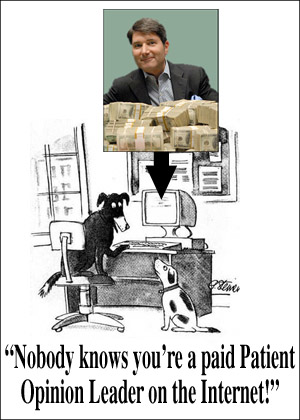Should Pharma Hire Online “Patient Opinion Leaders”?
Survey began 5 November 2010
This survey asks YOUR opinion about best practices that you think should govern pharma’s collaboration with online “Patient Opinion Leaders” (POLs) and whether or not it is necessary for the pharmaceutical industry to develop public guidelines for interactions with patients online and, if so, what issues those guidelines should address.
See Resources & Further Reading below… Background 
The pharmaceutical industry has a long tradition of working with individual patients and patient organizations. Sometimes the goal is to promote a specific product, but more often the goal is to raise awareness about a disease or medical condition for which the company has a specific Rx treatment.
Pharma companies have hired patients as spokespeople (see “Behrman Wasn’t the First Patient Spokesperson Paid Big Bucks By BMS“), given grants to patient advocacy groups (see “Pharma Dollars (Pounds, Euros) are Grassroots Seeds“), recruited individual patients to participate in market research focus groups (see “Levitra Market Research: The Interview“), and now may be hiring individual patients to monitor, moderate, or participate in online patient forums (see “J&J Agents Trolling for Adverse Events on the Internet“).
Some patients welcome this collaboration with pharma and have been very vocal about the desire to be hired by pharmaceutical companies to help them moderate or manage online patient forums (see “Some Social Media Patient Opinion Leaders Want to be Paid Pharma Professionals“).
Currently, pharmaceutical marketers are talking about “stepping in” to join discussions patients are having online. In the near future pharma companies may hire influential online patients to act as “patient opinion leaders” (POLs) just as they have hired physicians to be key opinion leaders (KOLs). Congressional committees may investigate the relationships between the pharmaceutical industry and POLs just as they are now doing with KOL relationships. Once that happens, news media and the blogosphere are sure publish stories and post items about the financial relationships between POLs and the pharmaceutical industry. Finally, government regulatory agencies may take notice. In fact, Jim Zuffoletti, president openQ, predicted in an industry conference presentation that “social media driven patient advocates or Patient Opinion Leaders will receive significant scrutiny” by the HHS’s Office of Inspector General (OIG) as early as 2011.
This survey is an attempt to determine the issues involving transparency and conflicts of interest that may arise if and when pharma companies pay individual POLs to help manage their engagement with patients online. What best practices should govern pharma’s collaboration with POLs? Should the industry develop guidelines for their interactions with POLs via social networks (eg, develop a “Patient Opinion Leader Transparency Policy”)?
Please take a few minutes to tell us YOUR opinion about best practices that you think should govern pharma’s collaboration with POLs and whether or not it is necessary for the pharmaceutical industry to develop public guidelines for interactions with patients online and, if so, what issues those guidelines should address.
Sincerely,
John Mack, Editor, Pharma Marketing News
Results of this survey may be summarized in Pharma Marketing News. After you answer a few short questions, you will be able to see the summary of all responses to date. No comments or other identifying information is included in the summary.
- Some Social Media Patient Opinion Leaders Want to be Paid Pharma Professionals
- A Call for Pharma Social Media Transparency Guidelines for Patient Bloggers
- Patient opinion leader (Wikipedia entry)
- Results of this survey will be summarized in an issue of Pharma Marketing News.




![6 Digital Tools at the Center of Healthcare Digitalization [INFOGRAPHIC]](http://ec2-54-175-84-28.compute-1.amazonaws.com/pharma-mkting.com/wp-content/uploads/2021/04/6DigitalTools_600px-100x70.jpg)




